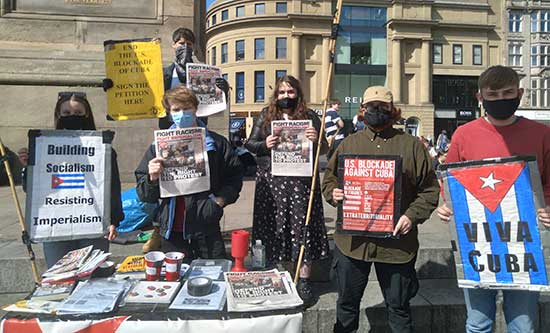
On 16 May, the US Biden administration announced changes to its policy toward Cuba that would ‘extend support to the Cuban people…to pursue a life free from Cuban government oppression and to seek greater economic opportunities.’ Behind the arrogant tone, the unilateral changes amount to a loosening of certain US blockade measures that were introduced under the Trump administration. This setback for imperialism is a result of the principled stand taken by Latin American and Caribbean countries, emboldened by the US’s escalating rivalry with Russia and China and its desperate search for alternative sources of oil such as Venezuela. Mexico, Bolivia, Honduras and 15 Caribbean Community states have refused to participate in the Ninth Summit of the Americas in Los Angeles on 6-10 June unless Cuba, Venezuela and Nicaragua are invited. Biden’s concessions include:
- Reinstating the Cuban Family Reunification Parole Programme, suspended five years ago, allowing Cuban family members of US citizens to travel to the US while they wait for the right to reside there permanently.
- Re-opening consular services at the US embassy in Havana, meaning Cubans will no longer have to apply for residency in the US via the prohibitive route of accessing the US embassy in Guyana, South America.
- Authorising flights between the US and Cuba’s provincial cities, and ‘group people-to-people travel’, allowing organised group trips to Cuba from the US; ‘individual people-to-people travel’ is still prohibited.
- Lifting the $1,000 per quarter restriction on Cubans in the US sending money remittances to Cuba. However, in practice such transfers, which formerly provided around $3.5bn per year to the Cuban economy, remain prohibited as Cuban financial institutions are still blockaded under Trump-era legislation which Biden has not yet removed.
Cuba’s Foreign Minister Bruno Rodriguez called the announcement ‘a limited step in the right direction. [This] doesn’t modify the blockade, [Cuba’s] fraudulent inclusion in the list of state sponsors of terrorism, nor most of Trump’s coercive “maximum pressure” measures that still affect the Cuban people.’
The US announcement follows high-level talks with Cuba since April 2022 to resolve a growing migration crisis: following Trump’s closure of consular services at the Havana US embassy in 2017, visa approvals dropped by 90%. Trump introduced 243 new blockade measures against Cuba, creating scarcity and a daily struggle to access goods, which until now had only been added to by Biden despite his campaign promises to promptly reverse Trump-era sanctions. Combined with economic hardship caused by the Covid-19 pandemic, this has led to tens of thousands of Cuban migrants taking dangerous and irregular routes to reach the US in recent months. More than 35,000 Cubans attempted to reach the US in April 2022, 115,000 since September 2021, which is more than during the 1994 ‘rafters crisis’ after the collapse of the socialist bloc caused a deep recession in Cuba.
At the same time, Biden has one eye on the November mid-term elections; too much conciliation with Cuba will upset the reactionary anti-Cuban lobby based in the key swing state of Florida. Now is the time to heap the pressure on the US by challenging its illegal blockade on every front.
Will Jones
Fight Racism! Fight Imperialism! No 288, June/July 2022




